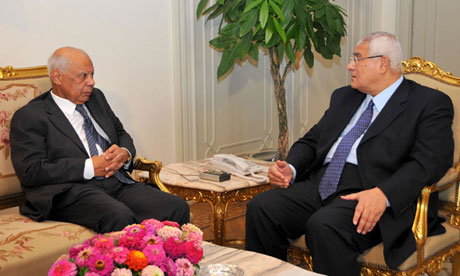World Class
Army says it is determined to tackle challenges facing country, while warning against political 'manoeuvring'

Egypt's interim
president Adly Mansour, right, meets Hazem el-Beblawi, who has been
appointed PM, at the El-Thadiya presidential palace in Cairo.
Photograph: Reuters
Egypt's military-backed interim presidency moved to implement a speedy transition to civilian rule on Tuesday, appointing economist Hazem el-Beblawi as prime minister and the internationally-known opposition leader Mohamed ElBaradei as vice-president.
In a tense atmosphere following the killing of 55 supporters of the deposed president Mohamed Morsi and threats of new mass protests by his supporters, the army also warned against political "manoeuvring" at a time of instability and anxiety – apparently to forestall more squabbling about other cabinet posts.
General Abdel-Fatah al-Sisi, the defence minister and armed forces commander who ousted Morsi last week, said in a statement broadcast on state TV that the military was determined to tackle the challenges facing Egypt in "these difficult circumstances". Sisi's message was also a greeting to Egyptians on the occasion of the Muslim Ramadan holiday, which begins on Wednesday in an unusually joyless national mood.
Beblawi, a respected former finance minister, will lead a technocratic government whose other members have yet to be announced. Crucially, however, it looks unlikely to include any Islamists. The Muslim Brotherhood is holding out for Morsi's restoration, which does not now seem likely.
ElBaradei, a Nobel Prize laureate, was on the verge of being named prime minister last week but at the last minute that was blocked by the Salafi Nour party. His role is a fillip for liberals.
Egypt's interim government also announced plans for new elections and drew up an interim constitution that gave full executive and legislative plans to the interim president, Adly Mansour. The charter was criticised by the Tamarod campaign, the grassroots movement that brought millions to the streets against Morsi in recent weeks. But it was welcomed by the US, which has previously expressed concerns about Morsi's removal, but which – according to one US official – welcomed the way that Egyptian officials had now "laid out a plan for the path forward".
Morsi supporters were still gathering near the scene of Monday's killings, described as a massacre by the Brotherhood but defended by the army and a uniformly uncritical state media as a response to a "terrorist" attack.
At the Rabaa Adawiya sit-in, the ground-zero of the Islamist presence in east Cairo, the crowds were more sombre than agitated. Mourners left rings of stones where their friends had died, and only a few chanted insults at the soldiers guarding the barbed wire fence that blocked one entrance to the site.
"It was criminal, it was treason," said Mahmoud Mohamed, a Salafi from Minya, of Monday's massacre. "But protesters are righteous people. We don't know violence. We will only resist with peaceful chanting."
Sherif Mohamed, a teacher from Cairo, said: "The army is trying to falsify the news, cover up their actions. But we are fearless, we are determined. We will continue to stand here in support of legitimacy."
At Cairo's Zeinhom morgue, where many of those killed were taken, mourners of those killed were still waiting for their friends' bodies to be released – many still coming to terms with the horror of what happened. "It was barbaric," said Mohamed Abu Sayed, a lecturer at al-Azhar university, who was waiting for the body of his friend Mohamed Abdel Rahman. "It was a black day in the history of Egypt's army." Abu Sayed called for Islamists to continue their peaceful resistance in response.
The Brotherhood and other Islamist groups rejected a declaration by Mansour, calling for new parliamentary elections by next February after a referendum on an amended draft constitution, and then another presidential race.
Morsi, who is now under house arrest, won last year's election by a narrow majority against an old-regime candidate. The president's supporters say he was deposed by a military coup. Opponents call his removal by the military a continuation of the 2011 revolution.
Issam al-Erian, deputy chairman of the Brotherhood's political wing, the Freedom and Justice party, called the declaration "a constitutional decree by a man appointed by putschists" which "brings the country back to square one".
Beblawi's appointment looks likely to improve confidence, vital for a country with dwindling foreign currency reserves and desperate for new investment. "My impression of him is one of a tiger who knows what Egypt needs," said Angus Blair, a Cairo-based economist with the Signet Institute, responding to suggestions that Beblawi, at 77, is too old for the post.
"He is someone who will put people of competence around him. He is very refreshing in terms of his approach. He has a very blunt tone. He knows what the problems are, and how urgent it is to deal with them."
Underlining improving financial prospects, Saudi Arabia said it had approved a $5bn aid package to Egypt, comprising a $2bn central bank deposit, $2bn in energy products, and $1bn in cash. The UAE agreed to grant Egypt $1bn and lend it another $2bn. Both the conservative Gulf monarchies were hostile to Morsi and the Brotherhood.
The donations capped a topsy-turvy day in Egyptian politics, after development economist Samir Radwan told the Guardian he had been promised the premiership, only to be usurped at the eleventh hour by Beblawi. When the Guardian contacted Radwan following the announcement of Beblawi's appointment, Radwan said that the last time he spoke to the presidency, he had been assured he was "top of the list".
No comments:
Post a Comment
Thanks for your comment, keep reading our news and articles